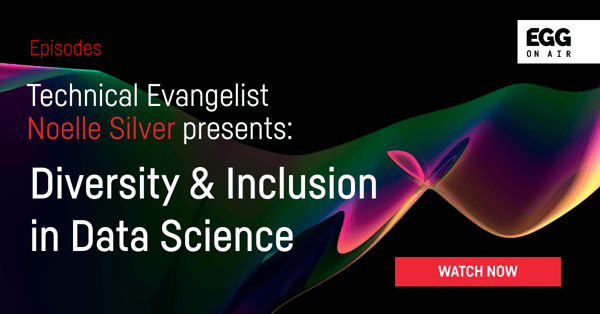Reports of AI gone wrong abound, and Responsible AI has started to take a foothold in business — Gartner has even added Responsible AI as a new category on its Hype Cycle for Emerging Technologies. Yet when talking about solutions, increasing diversity and making data science a more inclusive field unfortunately don’t often top the list. Noelle Silver, Head of Instruction, Data Science, Analytics, and Full Stack Web Development at HackerU, is looking to change that.
A 2018 study revealed that only 15% of data scientists are women, and sadly, a 2020 study found exactly the same results: it seems we haven’t managed to move the needle. While diversity obviously encompasses more than just women, few studies have been able to quantify other types of representation in the field. Inclusivity is similarly difficult to quantify, both in terms of people working on technology and the ways in which technology can be accessed by all. But that doesn’t mean there aren’t solutions.
What’s the Problem?
Before talking about solutions, let’s take a step back and identify the real problem. Noelle Silver said it best in her EGG On Air Episode:
“The reality is that when we train machine learning models with a bunch of data, it’s going to make predictions based on that data. If that data comes from a room of people that look the same, talk the same, act the same, they’re all friends — it’s not a bad scenario. In the moment, you feel like things are good. No one is really seeing any problems; you don’t feel any friction. It’s very misleading, especially in artificial intelligence. So you go to market.
The problem, though, is not everyone looks like you, or talks like you, or thinks like you. So even though you found a community of people that built this software that thinks the same, as soon as you go to market and someone other than that starts using it, they start to feel that friction.”
What’s the Answer?
Of course, there’s no easy, magic bullet solution to this problem, but foundations of a good start are:
- Committing the time and resources to practice inclusive engineering: This includes, but certainly isn’t limited to, doing whatever it takes to collect and use diverse datasets.
- Create an experience that welcomes more people to the field: This might mean looking at everything from education to hiring practices.
- Think beyond regulations: Simply being compliant doesn’t necessarily mean experiences are optimized.





